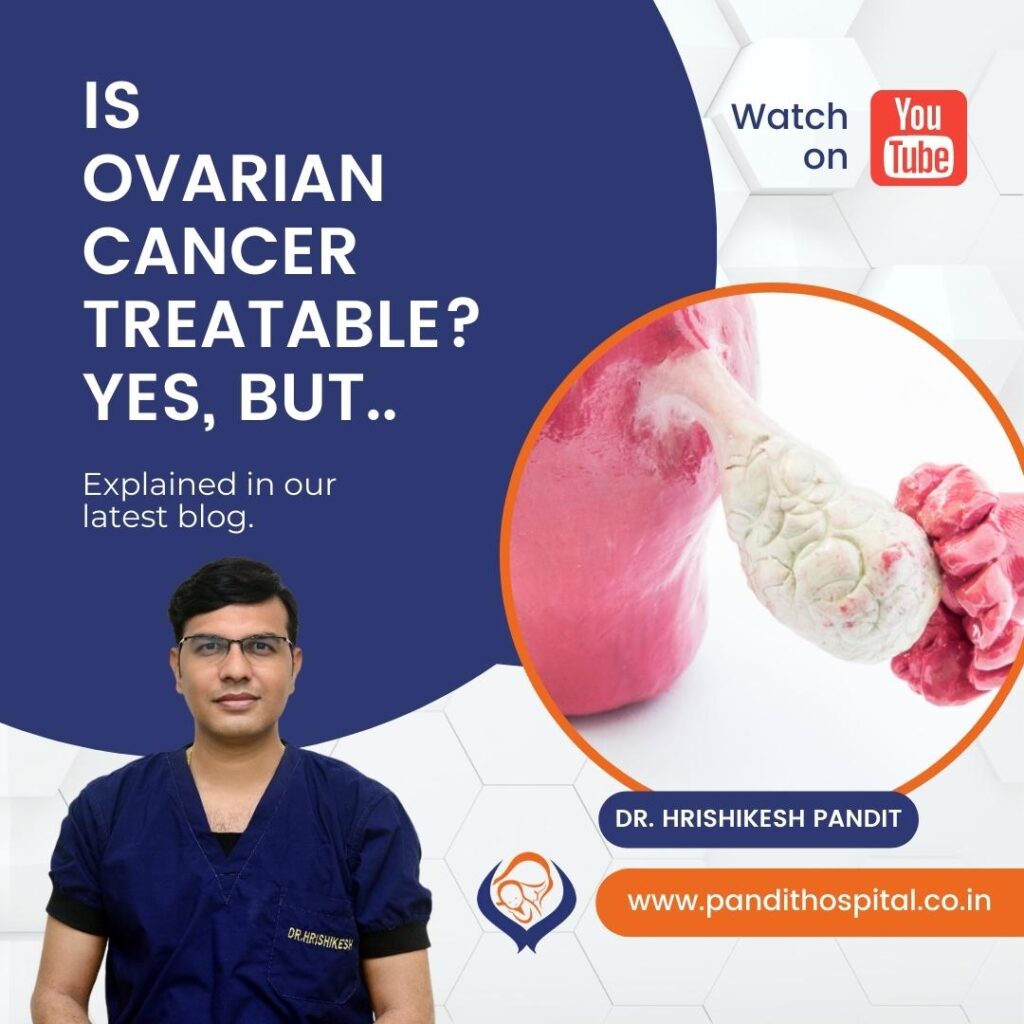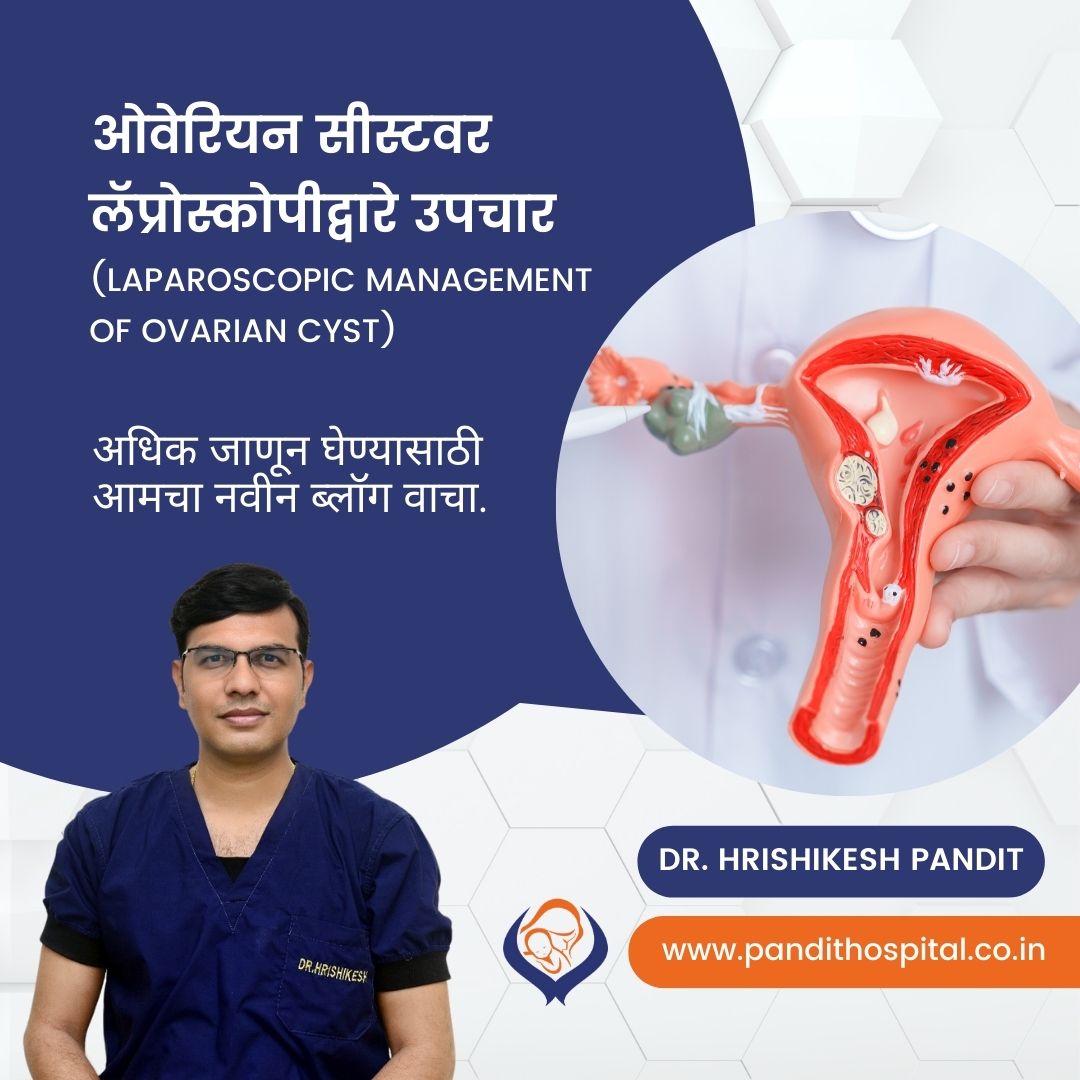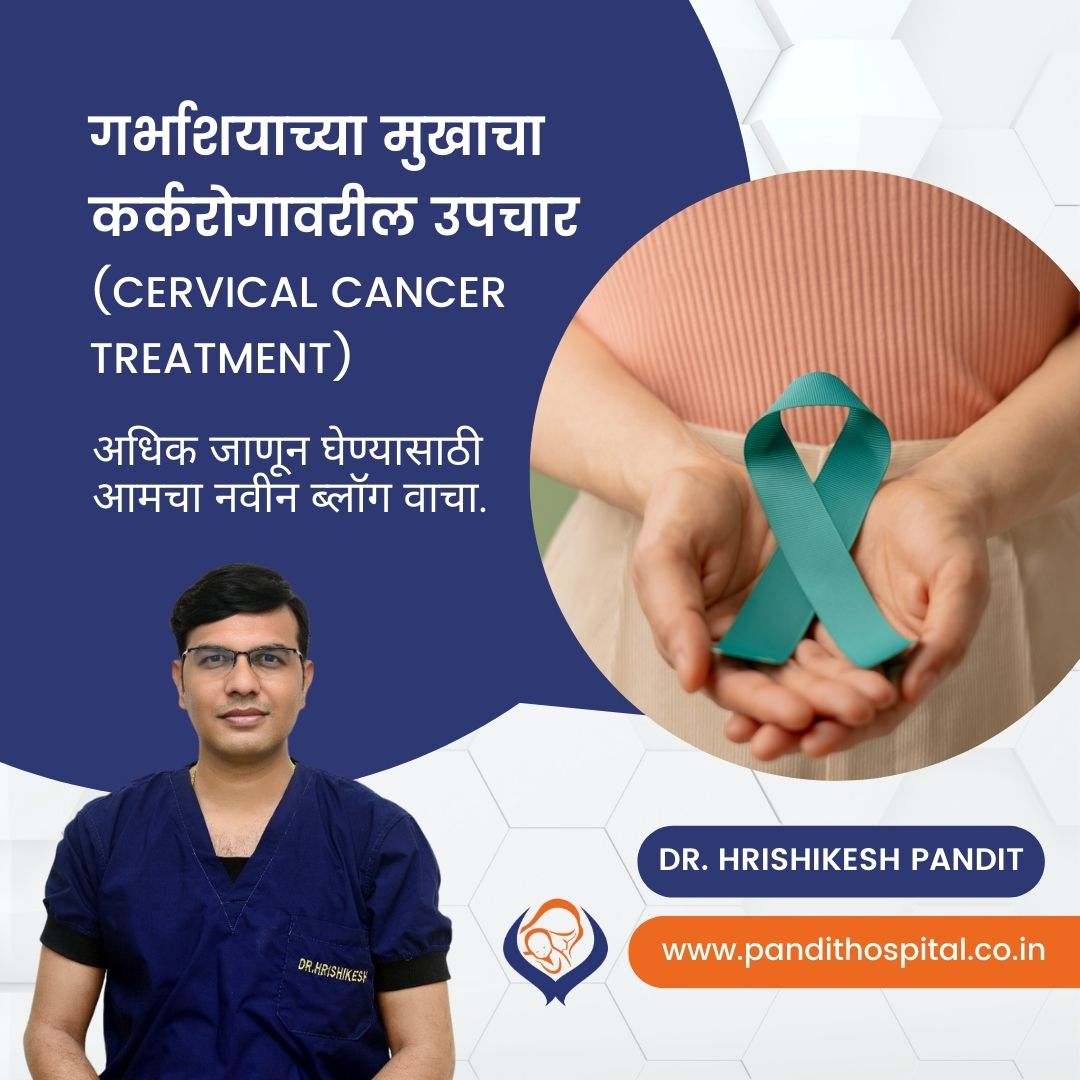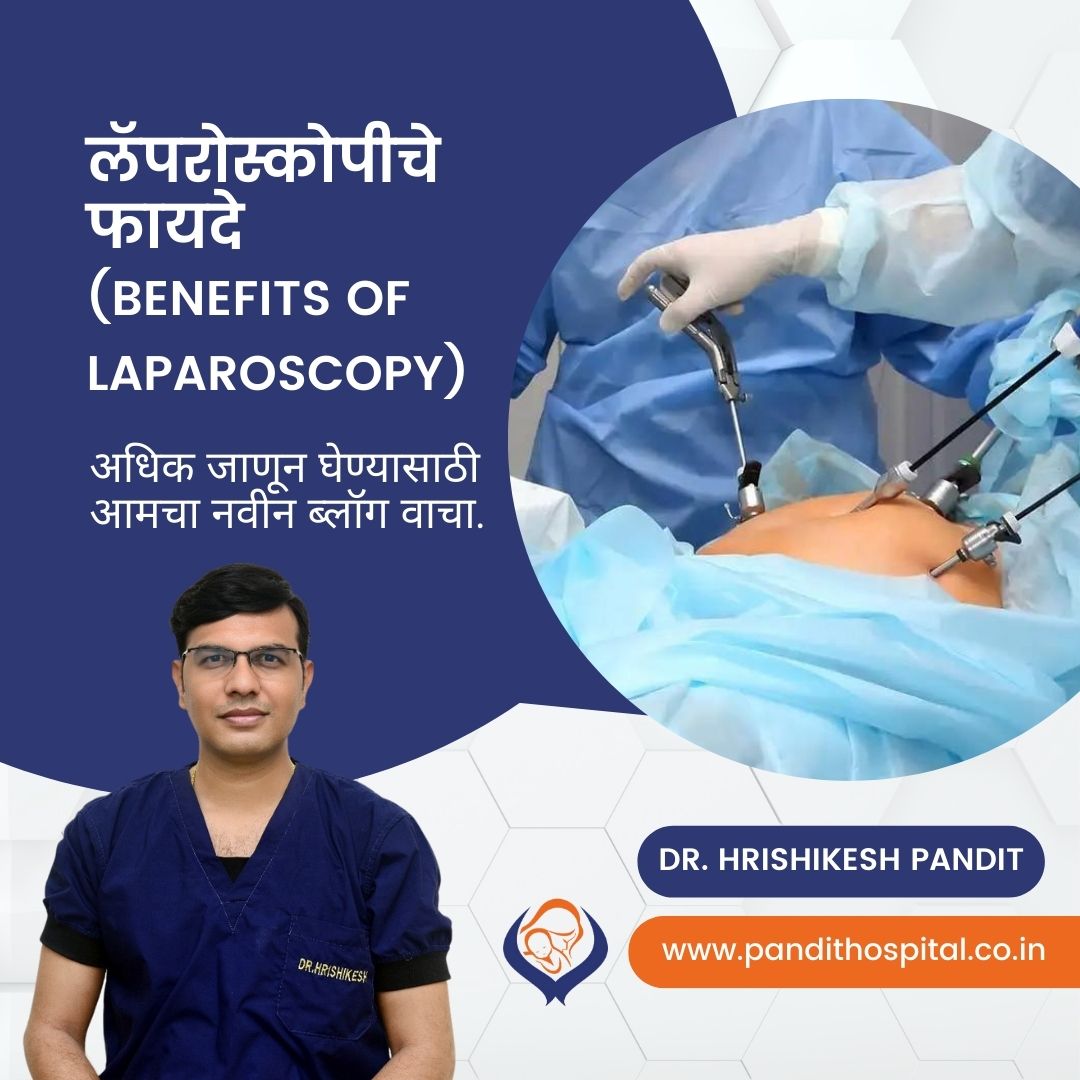Yes, Ovarian Cancer can be treated. But when diagnosed in early stage. Late-stage cancers don’t have good prognosis. Laparoscopic Hysterectomy remains the gold standard surgery for ovarian cancer. Diagnosis & Staging is very important in the management of ovarian cancer.
At Pandit Hospital, we started Ahmednagar’s First 3D laparoscopic center. Dr. Hrishikesh Pandit is one the best laparoscopic surgeon in India, with multiple international case presentations and accolades.
Recently Dr. Hrishikesh Pandit published one of his cases with

Laparoscopic Post Hysterectomy Removal of Solid Ovarian Tumor with Endobag Morcellation – Ovarian Cancer Treatment
Ovarian cancer is a growth of cells that forms in the ovaries. The cells multiply quickly and can invade and destroy healthy body tissue. Ovarian cancer is the third most common gynecological cancer in Indian women. The incidence of ovarian cancer is between 5.4 – 8/100000.The risk starts increasing from age 35 and reaches a peak between the ages of 55 – 64.
What are the symptoms of ovarian cancer?
- Abdominal bloating or swelling
- Quickly feeling full when eating
- Weight loss
- Discomfort in the pelvic area
- Fatigue
- Back pain
- Changes in bowel habits, such as constipation
- A frequent need to urinate
What are the risk factors for ovarian cancer?
- Older age.The risk of ovarian cancer increases as you age. It’s most often diagnosed in older adults.
- Inherited gene changes.A small percentage of ovarian cancers are caused by genes changes you inherit from your parents. The genes that increase the risk of ovarian cancer include BRCA1 and BRCA2. These genes also increase the risk of breast cancer.
Several other gene changes are known to increase the risk of ovarian cancer, including gene changes associated with Lynch syndrome and the genes BRIP1, RAD51C and RAD51D.
- Family history of ovarian cancer.If you have blood relatives who have been diagnosed with ovarian cancer, you may have an increased risk of the disease.
- Being overweight or obese.Being overweight or obese increases the risk of ovarian cancer.
- Postmenopausal hormone replacement therapy.Taking hormone replacement therapy to control menopause signs and symptoms may increase the risk of ovarian cancer.
- Endometriosis is an often-painful disorder in which tissue similar to the tissue that lines the inside of your uterus grows outside your uterus.
- Age when menstruation started and ended.Beginning menstruation at an early age or starting menopause at a later age, or both, may increase the risk of ovarian cancer.
- Never having been pregnant.If you’ve never been pregnant, you may have an increased risk of ovarian cancer.
What are the diagnostic methods for ovarian cancer?
- Pelvic Examination
- Pelvic ultrasound.
- MRI (magnetic resonance imaging).
- CT scan (computed tomography).
- PET scan (positron emission tomography).
- Diagnostic Laparoscopy.
How is ovarian cancer treated?
Surgery. This typically involves the removal of your reproductive organs and any organ that has cancer on it. Your surgeon may use laparoscopy (a minimally invasive surgery) or laparotomy (open surgery that requires an abdominal incision).
Total Laparoscopic Hysterectomy will help in removal of any tumor mass within ovary and in surrounding tissue.
Chemotherapy. Your provider may recommend chemotherapy either before or after surgery. Chemotherapy are drugs designed to target and kill cancerous cells. Your provider may give you chemotherapy intravenously (through a vein) or orally (in pill form).
Targeted therapy. This cancer treatment uses drugs to identify and attack cancer cells. Targeted therapy changes the way cancer cells grow and divide.
Hormone therapy. Some ovarian cancers use hormones to grow. This type of therapy blocks hormones, slowing or stopping the growth of cancer.
Radiation therapy. Providers rarely use radiation therapy for treatment of ovarian cancer.
Where can you get total laparoscopic hysterectomy (TLH) in Ahmednagar?
At Pandit Hospital, Ahmednagar.
Where can you get Ovarian Cancer Treatment in Ahmednagar?
At Pandit Hospital, Ahmednagar.
What is the cost of total laparoscopic hysterectomy (TLH) in Ahmednagar?
It depends upon associated factors and pathology behind the requirement of the procedure. At Pandit Hospital, Ahmednagar, we provide total laparoscopic hysterectomy (TLH) at around ₹30,000.
Dr. Hrishikesh Pandit is the pioneer pf 3D laparoscopy technique in Ahmednagar. His experience and skill makes him one of the best laparoscopic surgeon in India.
At Pandit Hospital, you are in safe hands!
To consult Dr. Hrishikesh Pandit, Click Below,
Pandit Hospital – Best Maternity care center in Ahmednagar
LET’S SEE OUR INTRO VIDEO
At Pandit Hospital, we provide all the maternity services from antenatal to postnatal period under one roof
Let's Connect!!
0241-2441717 / 0241-2442344
About author:
Dr. Hrishikesh Pandit:
Dr. Hrishikesh Pandit is one of the best obstetrician and gynecologist in India. He is also a well-renowned Laparoscopic surgeon. He obtained his MS (Ob Gyn) degree from the prestigious Pravara Institute of Medical Sciences. He has also done fellowship and diploma courses in laparoscopic surgeries and cancer treatment from Tata Hospital and Keil University, Germany. His surgical cases, papers and videos has been chosen in many international forums of gynecology.
At Pandit Hospital, we are always working hard to provide its patients with the highest level of medical innovation and patient care. With the aim of delivering complete maternity & gynecological care under one roof with the help of all contemporary amenities and cutting-edge medical equipment. Dr. Hrishikesh Pandit has a vision to bring the best of facilities regarding laparoscopy surgeries in the city of Ahmednagar. He is the pioneer of 3D Laparoscopy technology is Ahmednagar.
Latest Articles
Dr. Hrishikesh Pandit is one of the best laparoscopy surgeons in India. His determination to bring 3D Laparoscopy technology to Ahmednagar has eventually helped so many patients. Read the latest articles by Dr. Hrishikesh Pandit on Gynecology, gastric issues, and health tips for mothers during pregnancy.
Discover comprehensive ovarian cyst treatments at Pandit Hospital in Ahmednagar, Maharashtra, led by 3D Laparoscopic Surgeon Dr. Hrishikesh Pandit. Learn about types, symptoms, and both surgical and non-surgical treatments. Best ovarian cyst removal hospital in India.
गर्भाशयाच्या मुखाचा कर्करोग हा महिलांमध्ये होणारा दुसरा सर्वात गंभीर कॅन्सर आहे. वयाच्या 35 व्या वर्षानंतर या आजाराचा धोका फार वाढतो. गर्भाशयाच्या कर्करोगावर लॅपरोस्कोपी (दुर्बिणीने) शस्त्रक्रियेद्वारे उपचार केले जाऊ शकतात.
लॅपरोस्कोपिक शस्त्रक्रियेचे अनेक फायदे आहेत ✔ कमी वेदना ✔ कमी रक्तस्त्राव ✔ रुग्णालयात किमान मुक्काम ✔ जलद रिकव्हरी ✔ कमी कॉम्प्लिकेशन्स ✔ कमी टाके ✔अंतर्गत अवयवांना कमी इजा. Benefits of laparoscopy &Marathi)
FAQ
You should consult a doctor during the first 6 to 8 weeks of your pregnancy, or when your period is 2 to 4 weeks late.
If your contractions are 5 minutes apart, lasting for 1 minute, for 1 hour or longer, it’s time to head to the hospital.
Doctors recommend an infertility evaluation if you have not gotten pregnant after 1 year of having regular sexual intercourse without using birth control. If you are older than 35, an evaluation is recommended after 6 months of trying.
Yes, You can. But most babies need 39 weeks to develop fully. Induced or planned delivery before that time—without a valid medical reason—is not in the best interest of the baby or the mother. After 39 weeks you can plan delivery.
Women who are 21 to 29 should have a Pap test alone every 3 years. HPV testing alone can be considered for women who are 25 to 29, but Pap tests are preferred. Women who are 30 to 65 have three options for testing. They can have a Pap test and an HPV test (co-testing) every 5 years. They can have a Pap test alone every 3 years. Or they can have HPV testing alone every 5 years.
Laparoscopic hysterectomy is a safe and suitable procedure for chosen patients. It affords patients advantages like less peri-operative morbidity, better life quality, shorter hospitalization time, and faster return to activity.
Schedule a doctor’s visit if you have: Greenish, yellowish, thick or cheesy vaginal discharge; Strong vaginal odor; Redness, itching, burning or irritation of your vagina or the area of skin that surrounds the vagina and urethra (vulva); Bleeding or spotting unrelated to your period.
Painless delivery can be achieved using a form of regional anesthesia that provides pain relief during natural labor. Epidural anesthesia is administered through an injection on the lower back of the mother. The drug takes about 10-15 minutes to take effect.
Even in severe cases of endometriosis, most can be treated with laparoscopic surgery. In laparoscopic surgery, your surgeon inserts a slender viewing instrument (laparoscope) through a small incision near your navel and inserts instruments to remove endometrial tissue through another small incision.
The HPV vaccine is recommended for routine vaccination at the age of 11 or 12 years. (Vaccination can be started at age 9.) It is also recommended that vaccination for everyone through age 26 years if not adequately vaccinated when younger. HPV vaccination is given as a series of either two or three doses, depending on age at initial vaccination.




